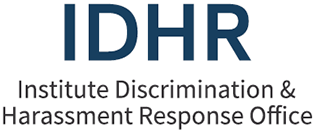Prohibited Conduct | For Allegations Against Students | Procedures for Discrimination & Discriminatory Harassment
Members of the MIT community are strongly encouraged to promptly report all incidents of discrimination and discriminatory harassment, including sexual misconduct, intimate partner violence, and stalking. Prompt reporting of such incidents makes investigation more effective and enhances the ability of MIT to take action. Any MIT student who believes they have been subjected to discrimination and discriminatory harassment, including sexual misconduct, intimate partner violence, or stalking, by another MIT student may initiate a complaint by speaking to IDHR Staff or MIT Deputy Title IX Coordinators.
Access the Institute Discrimination and Harassment Office Guide to the Investigation of Formal Complaints of Discrimination and Discriminatory Harassment (“IDHR Investigation Guide”).
These procedures generally apply to any allegation of discrimination and discriminatory Harassment, including sexual misconduct, intimate partner violence, or stalking brought against an MIT student by another member of the MIT community.
In addition to raising a complaint within MIT, individuals may also file a criminal complaint with the MIT Police, Cambridge Police, or the local law enforcement agency where the misconduct occurred. The standards for finding a violation of law are different from the standards used by MIT in determining whether there has been a violation of MIT’s policy. The filing of a complaint of discrimination and discriminatory harassment, including sexual misconduct, intimate partner violence, or stalking, with MIT is independent of any criminal investigation or proceeding (although MIT’s investigation may, in some cases, be delayed temporarily while the criminal investigators are gathering evidence) and MIT will generally not wait for the conclusion of any criminal proceeding to start its own investigation.
Initial Assessment of Reports Concerning Discrimination and Discriminatory Harassment
Upon an initial report to the Institute Discrimination and Harassment Response Office claiming discrimination, including sexual misconduct, intimate partner violence, and stalking, the IDHR Director, or designee, will make an initial assessment of the reported information and respond to any immediate health or safety concerns raised by the report. In this initial assessment, the IDHR Director, or designee, will:
- Assess the Complainant’s safety and well-being and offer the Institute’s immediate support and assistance;
- In cases involving recent physical or sexual assault, inform the Complainant of the right to seek medical treatment, and explain the importance of obtaining and preserving forensic and other evidence;
- In cases involving allegations of criminal conduct, inform the Complainant of the right to contact law enforcement, decline to contact law enforcement, and/or seek a court ordered protective order;
- Inform the Complainant about Institute and community resources, the right to seek supportive measures, and how to request those resources and measures;
- Inform the Complainant of formal and informal resolution options; determine the Complainant’s expressed preference at this time for pursuing Informal/Adaptable Dispute Resolution, formal resolution, or neither; and discuss with the Complainant any concerns or barriers to participating in any Institute investigation and resolution under this process;
- Explain the Institute’s prohibition against retaliation and that the Institute will take prompt action in response to any act of retaliation;
- Ascertain the ages of the Complainant and the Respondent, if known, and, if either of the parties is a minor (under 18), determine whether to contact the appropriate child protective service agency; and
- Assess the information provided to determine if it triggers any Clery Act obligations and, if so, submit a Clery Report Form to MIT Police.
Click the following buttons to learn more about different options for addressing discrimination and discriminatory harassment.
| Supportive Measures | Adaptable Resolution | Investigation Process |


